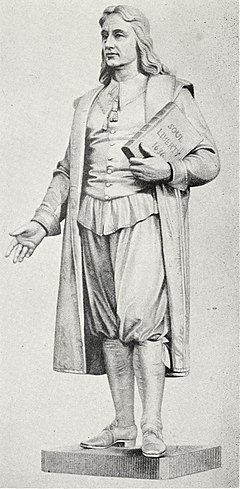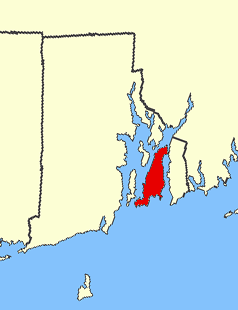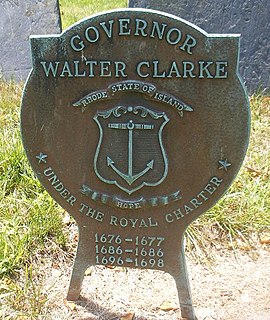
Roger Williams was a Puritan minister, theologian, and author who founded the Colony of Rhode Island and Providence Plantations. He was a staunch advocate for religious freedom, separation of church and state, and fair dealings with American Indians, and he was one of the first abolitionists.

Aquidneck Island, officially Rhode Island, is an island in Narragansett Bay and in the State of Rhode Island and Providence Plantations, which is partially named after the island. The total land area is 97.9 km2 (37.8 sq mi), which makes it the largest island in the bay. The 2000 United States Census reported its population as 60,870.

John Clarke was a physician, Baptist minister, co-founder of the Colony of Rhode Island and Providence Plantations, author of its influential charter, and a leading advocate of religious freedom in America.

William Coddington was an early magistrate of the Massachusetts Bay Colony and later of the Colony of Rhode Island and Providence Plantations. He served as the judge of Portsmouth and Newport, governor of Portsmouth and Newport, deputy governor of the four-town colony, and then governor of the entire colony. Coddington was born and raised in Lincolnshire, England. He accompanied the Winthrop Fleet on its voyage to New England in 1630, becoming an early leader in Boston. There he built the first brick house and became heavily involved in the local government as an assistant magistrate, treasurer, and deputy.

John Coggeshall Sr. was one of the founders of the Colony of Rhode Island and Providence Plantations and the first President of all four towns in the Colony. He was a successful silk merchant in Essex, England, but he emigrated to the Massachusetts Bay Colony in 1632 and quickly assumed a number of roles in the colonial government. In the mid-1630s, he became a supporter of dissident minister John Wheelwright and of Anne Hutchinson. Hutchinson was tried as a heretic in 1637, and Coggeshall was one of three deputies who voted for her acquittal. She was banished from the colony in 1638, and the three deputies who voted for her acquittal were also compelled to leave. Before leaving Boston, Coggeshall and many other Hutchinson supporters signed the Portsmouth Compact in March 1638 agreeing to form a government based on the individual consent of the inhabitants. They then established the settlement of Portsmouth on Aquidneck Island, one of the four towns comprising the Colony of Rhode Island and Providence Plantations.
Christopher Holder (1631–1688), was an early Quaker evangelist who was imprisoned, whipped, had an ear cut off, and threatened with death for his religious activism in the Massachusetts Bay Colony and in England. A native of Gloucestershire, near Bristol in western England, Holder became an early convert to the Society of Friends, and in 1656, at the age of 25, made his first voyage to New England aboard the Speedwell to spread his Quaker message. All of the Quakers in his group were imprisoned, and then sent back to England on the same ship. Undeterred, Holder returned to New England aboard the small barque Woodhouse, landing in New Amsterdam in August 1657 despite few predictions of success. Though young, he was a leader among the eleven Quaker missionaries that fanned out among the American colonies. Holder, with his frequent companion John Copeland, went north to the Massachusetts Bay Colony to begin their evangelistic efforts in the face of increasingly threatening anti-Quaker laws. With little success on Martha's Vineyard, they moved to Cape Cod where they were warmly received in Sandwich, establishing the earliest Quaker meeting in America.

Benedict Arnold was president and then governor of the Colony of Rhode Island and Providence Plantations, serving for a total of 11 years in these roles. He was born and raised in the town of Ilchester, Somerset, England, likely attending school in Limington nearby. In 1635 at the age of 19, he accompanied his parents, siblings, and other family members on a voyage from England to New England, where they first settled in Hingham in the Massachusetts Bay Colony. In less than a year, they moved to Providence Plantation at the head of the Narragansett Bay at the request of Roger Williams. In about 1638, they moved once again, about five miles south to the Pawtuxet River, settling on the north side at a place commonly called Pawtuxet. Here they had serious disputes with their neighbors, particularly Samuel Gorton, and as a result put themselves and their lands under the jurisdiction of Massachusetts, a situation which lasted for 16 years.
Dyer Island is an island in Narragansett Bay in Rhode Island, United States. It lies off the west coast of Aquidneck Island and is part of Melville CDP, which itself is part of the town of Portsmouth. The island lies between Melville and Prudence Island and is uninhabited and has a land area of 0.12 km² and is only 13 feet above sea level.
Nicholas Easton (c.1593–1675) was an early colonial President and Governor of Rhode Island. Born in Hampshire, England, he lived in the towns of Lymington and Romsey before immigrating to New England with his two sons in 1634. Once in the New World, he lived in the Massachusetts Bay Colony towns of Ipswich, Newbury, and Hampton. Easton supported the dissident ministers John Wheelwright and Anne Hutchinson during the Antinomian Controversy, and was disarmed in 1637, and then banished from the Massachusetts colony the following year. Along with many other Hutchinson supporters, he settled in Portsmouth on Aquidneck Island, later a part of the Colony of Rhode Island and Providence Plantations. He was in Portsmouth for about a year when he and eight others signed an agreement to create a plantation elsewhere on the island, establishing the town of Newport.

Walter Clarke (1640–1714) was an early governor of the Colony of Rhode Island and Providence Plantations and the first native-born governor of the colony. The son of colonial President Jeremy Clarke, he was a Quaker like his father. His mother was Frances (Latham) Clarke, who is often called "the Mother of Governors." While in his late 20s, he was elected as a deputy from Newport, and in 1673 was elected to his first of three consecutive terms as assistant. During King Philip's War, he was elected to his first term as governor of the colony. He served for one year in this role, dealing with the devastation of the war, and with the predatory demands of neighboring colonies on Rhode Island territory during the aftermath of the war.
WilliamEdmundson or Edmondson (1627—1712) was the founder of Quakerism in Ireland. He was born in Little Musgrave, Westmorland, England in 1627. His parents died when he was young, and so he was raised by an uncle. He was apprenticed as a carpenter at York, and after completion, he joined the Parliamentary Army during the English Civil War. He went to Scotland in 1650. He also took part in the Battle of Worcester. While serving in the military, he was first introduced to Quakerism while stationed at Chesterfield. He was discharged and eventually went to live in County Antrim, Ireland.

John Wanton was a governor of the Colony of Rhode Island and Providence Plantations, serving for six consecutive terms from 1734 to 1740. He was the son of Edward Wanton who was a ship builder, and who became a Quaker after witnessing the persecution of these people, also becoming a preacher of that religion. Edward Wanton had lived in York, Maine; Boston, Massachusetts; and Scituate, Massachusetts before coming to Rhode Island.
Richard Scott (1605–1679) was an early settler of Providence Plantations in what became the Colony of Rhode Island and Providence Plantations. He married Katherine Marbury, the daughter of Reverend Francis Marbury and sister of Puritan dissident Anne Hutchinson. The couple emigrated from Berkhamsted in Hertfordshire, England with an infant child to the Massachusetts Bay Colony where he joined the Boston church in August 1634. By 1637, he was in Providence signing an agreement, and he and his wife both became Baptists for a time. By the mid-1650s, the Quaker religion had taken hold on Rhode Island, and Scott became the first Quaker in Providence.

Portrait of a Clergyman — sometimes called Portrait of a 17th Century Clergyman or The Unknown Clergyman — is an oil on canvas portrait painting by Guilliam de Ville dated 1639. The identity of the subject, an elderly clergyman, is unknown. It is owned by the Redwood Library and Athenaeum, Newport, Rhode Island, USA, where it hangs.









